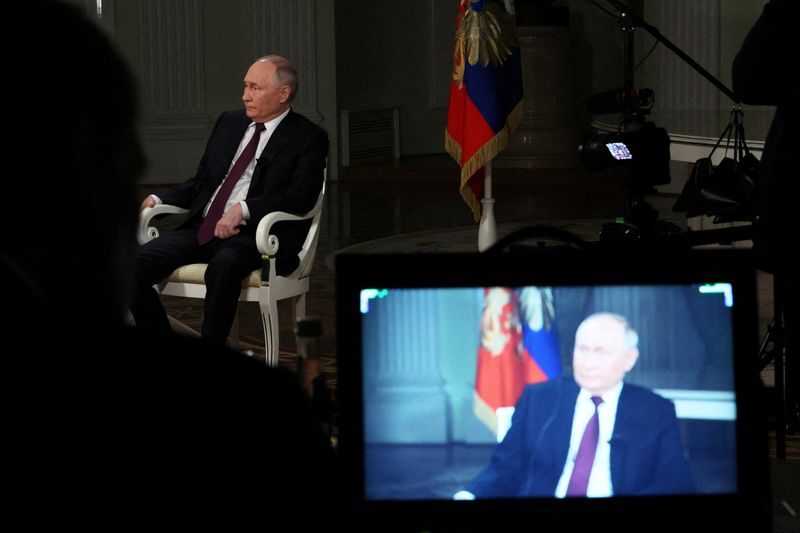Russian pupils take history quiz based on Putin’s Tucker Carlson interview

FILE PHOTO: Russian President Vladimir Putin listens during an interview with U.S. television host Tucker Carlson in Moscow, Russia February 6, 2024. Sputnik/Gavriil Grigorov/Kremlin via REUTERS
By Mark Trevelyan and Lucy Papachristou
LONDON (Reuters) – Pupils across Russia have taken part in a history quiz this month that involved watching extracts of President Vladimir Putin’s interview with U.S. journalist Tucker Carlson, according to posts by numerous schools on social media.
Putin began the two-hour interview in February by lecturing Carlson for about half an hour on the history of Russia from the year 862, arguing that Ukraine had no tradition of independent statehood – a notion rejected by Kyiv as false and self-serving.
In posts on Russian social media platform VK, schools described the quiz as an “intellectual game” that helped children understand “the stages of development of the Russian state”, and said it was both entertaining and instructive.
In some cases, it appeared that children as young as six or seven had taken part. A school in Rostov, southern Russia, said pupils in classes one through 11 had watched parts of the interview and then answered questions appropriate to their age.
The Domodedovskaya grammar school posted that children had been tasked after the 11-round quiz with thinking of questions to send to Putin. It said that since it was a nationwide event, “unfortunately not everyone will receive answers from the president, but we’re still hopeful!”
Reuters sent requests for comment to eight head teachers and teachers at schools that took part in the event. None of them have so far responded.
The quiz was first reported by “Ne Norma”, a volunteer association that tracks the ways in which the world view underpinning Putin’s invasion of Ukraine is being instilled in Russian children.
Dmitry Tsibiryov, a spokesperson for the project, said it was no surprise that the Carlson interview was being shown to children, given the “mass propaganda coverage” it had generated in state media.
It was not clear which clips had been used in the quiz. Carlson was criticised after the interview for failing to push the Kremlin leader hard enough, and even Putin said he would have liked tougher questions.
The multiple-choice quiz questions were designed to reinforce points that Putin had made. Children were expected, for example, to know that the word “Ukrainian” in the 13th century could denote a border guard or someone who lived in the borderlands, but not an inhabitant of a country called Ukraine.
Tsibiryov said the quiz was just one example of a wider transformation of the curriculum since the start of the war, including the introduction of special lessons called “Important Conversations” that were often devoted to patriotic themes. Such lessons sometimes took the form of visits to schools by soldiers and veterans.
“Ne Norma” has previously publicised cases of children making items such as trench candles and camouflage nets to send to soldiers in Ukraine.
Last October it published a photograph of kindergarten children posing in soldiers’ hats in front of a screen with a quotation from 18th century general Alexander Suvorov: “A warrior’s appearance must instil terror in the enemy.”
Putin has told Russians it is important to unite at a time when the country is at war in Ukraine and facing what he says is an existential threat from the West. Last year Kremlin aide Vladimir Medinsky published four new history textbooks for 16- to 18-year-olds reflecting Putin’s view of the fall of the Soviet Union and the causes of the Ukraine conflict.
In a telephone interview, Tsibiryov said the education system was increasingly being used as a vehicle for propaganda aimed at “recruiting new participants, new volunteers for the war.”
“At best, it’s a useless waste of time,” Tsibiryov said. “The main harm it does is to inject this false sense of patriotism… These are probably convictions that can remain a long time with children in the future, even if they aren’t directly drawn into this war.”







